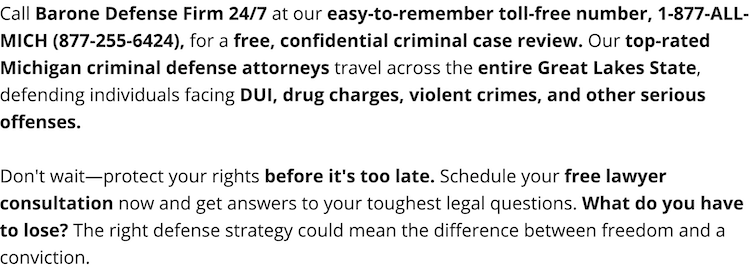Fraud Penalties
While considering Michigan fraud penalties after a conviction can be an overwhelming situation, know that you do not have to face it alone. A professional defense attorney could work to protect your rights and find holes in the prosecution's argument. A skilled lawyer could determine whether law enforcement incorrectly conducted your arrest, or if they carried out their investigation in a way that violated necessary procedure. Become acquainted with the following information to learn more about Michigan fraud penalties, as well as the ways a weathered criminal lawyer could offer you their assistance today.
Potential Consequences
In Michigan, a conviction for fraud can result in as many as 14 years of incarceration. However, one's Michigan fraud penalties for any given conviction will be dependent on the specific nature of the case. For instance, while credit card fraud is typically associated with four years of incarceration, an individual who is convicted of obtaining a signature by fraud may face up to 10 years of incarceration. Moreover, fraud may be charged as either a misdemeanor or a felony, with the latter associated with greater consequences.
It is important to note that if an individual is convicted of a felony and he or she has a felony record, this subsequent conviction is considered a crime of moral turpitude. This means that if the accused is ever charged again for a future crime, the prosecution may introduce evidence related to their prior convictions as indicative of their character. This is because multiple felony convictions may be seen as indicative of an individual's integrity, honesty, or morality under the law.
What Michigan Fraud Penalties Could Mean in the Long-Term
A fraud conviction can have a number of immediate, and significant, consequences. A fraud conviction can negatively impact both an individual's current and future employment. He or she may be precluded from working at a financial institution, or in any position that involves management of cash or monetary funds.
Moreover, negative consequences on an individual's livelihood may, in turn, negatively impact his or her relationships and well-being, holding lasting and far-reaching effects on all aspects of his or her life and future.
Situations Meriting a Plea Deal
If the charged individual is in a position to make the alleged fraud victim financially whole again, they will generally have a good chance of receiving a plea deal. The act of making the other party whole again is also known as restitution and may be achieved by repaying the injured individual or financial institution. If, however, the charged party is not in a position to make restitution, their likelihood of receiving a plea deal is dependent on the amount of money involved, the nature of the incident, and the charged individual's ability to make restitution in the future.
If the incident involved a significant amount of money, or if it is unlikely the defendant will have the ability to make the alleged victim whole in the future, it is unlikely that they will be offered a plea deal. However, it is important to note that a plea deal can play a significant role in a fraud case, helping the charged individual to avoid incarceration and minimize any negative impacts on his or her life. Given this, it is very important that any individual who has been charged with fraud contact an experienced fraud attorney as soon as possible in order to ensure that all possible negotiations may be made on his or her behalf.
Reaching Out to a Skilled Defense Attorney
If you wish to fight your potential Michigan fraud penalties, consider contacting a professional fraud lawyer as soon as possible. A dedicated attorney could negotiate on your behalf, craft a strong defense strategy, and act as an advocate for your rights. Because Michigan fraud penalties can have severe implications for one's future, it is of the utmost importance to gain protection right away. Consider reaching out to a weathered lawyer today in order to schedule your initial consultation.
 Barone Defense Firm Home
Barone Defense Firm Home




















